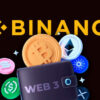
Innovative Use Cases of Decentralized Platforms in Various Industries
The advent of decentralized platforms has ushered in a transformative era across various industries, providing novel solutions to age-old challenges and opportunities for innovation.
Decentralization, typically built on blockchain technology, offers a paradigm shift away from traditional centralized systems, enabling greater security, transparency, and autonomy.
This introduction provides a glimpse into the innovative use cases of decentralized platforms that span a diverse range of sectors, from finance and healthcare to entertainment, governance, and more.
These groundbreaking applications are reshaping how industries operate and engage with stakeholders, fostering a new era of trust and efficiency. This exploration will delve into the specific use cases, their benefits, and their potential for shaping the future.
Finance and Banking
Here are use cases in the finance and banking sectors in a decentralized platform:
- Decentralized Finance (DeFi)
- Asset Tokenization
- Cross-Border Payments
Decentralized Finance (DeFi)
- Peer-to-peer lending and borrowing: DeFi platforms facilitate direct lending and borrowing among individuals, eliminating the need for traditional intermediaries like banks. Users can earn interest on their cryptocurrency holdings by lending them, while borrowers gain access to loans without going through a financial institution.
- Automated market makers: DeFi protocols use smart contracts and liquidity pools to enable decentralized and automated trading. Users can swap various cryptocurrencies without relying on centralized exchanges.
- Decentralized exchanges: DEXs, powered by blockchain technology, allow users to trade digital assets without a central authority. This promotes greater security, transparency, and control over one’s assets.
Asset Tokenization
- Real estate tokenization: Decentralized platforms enable the fractional ownership of real estate properties. This allows for easier investment diversification and access to real estate markets, which were traditionally illiquid and hard to access.
- Art and collectibles tokenization: High-value assets like art and collectibles can be represented as non-fungible tokens (NFTs) on blockchain platforms. This ensures provenance, authenticity, and effortless transfer of ownership.
Cross-Border Payments
- Remittances: Decentralized platforms simplify cross-border payments, reducing the costs and time associated with remittances. Users can send funds directly to recipients anywhere in the world without traditional banking intermediaries.
- Swift and cost-effective transactions: Blockchain-based systems offer quicker and cost-effective cross-border transactions compared to legacy banking systems. Cryptocurrencies like Bitcoin and stablecoins are frequently used for international money transfers.
Decentralized platforms in the finance and banking sector are disrupting the traditional financial system by providing more accessible and inclusive financial services. These innovations offer greater financial autonomy, reduced transaction costs, and increased financial inclusion for individuals and businesses globally.
Healthcare
Here are use cases in the healthcare sectors in a decentralized platform:
- Health Data Management
- Drug Supply Chain Management
- Telemedicine
Health Data Management
- Patient-controlled health records: Decentralized platforms allow patients ownership and control over their health data. They can securely share their medical records with healthcare providers and researchers, ensuring data privacy and consent management.
- Medical research data sharing: Medical researchers can securely access anonymized patient data through decentralized platforms, promoting collaboration and speeding up the development of new treatments and medical breakthroughs.
Drug Supply Chain Management
- Ensuring authenticity and safety: Blockchain-based platforms track pharmaceuticals’ journey from manufacturing to distribution. This ensures the authenticity and safety of drugs, reducing the risk of counterfeit or substandard medications.
- Reducing counterfeit drugs: By providing an immutable record of drug transactions, decentralized platforms can significantly reduce the circulation of counterfeit drugs, enhancing patient safety.
Telemedicine
- Decentralized healthcare applications: These applications provide secure and private communication channels for patients and healthcare providers. Patients can access healthcare services remotely while their medical data is securely stored on decentralized networks.
- Preserving patient privacy: Decentralized telemedicine platforms ensure patient data privacy and security, as health information is not stored on centralized servers vulnerable to data breaches.
Decentralized platforms in the healthcare industry are revolutionizing data management, supply chain transparency, and patient care.
By empowering patients with control over their health data, improving the integrity of drug supply chains, and enabling secure telemedicine solutions, these innovations contribute to a more efficient and patient-centric healthcare ecosystem.
Supply Chain Management
Here are use cases in the supply chain management sectors in a decentralized platform:
- Provenance Tracking
- Smart Contracts
- Sustainability
Provenance Tracking
- Food safety and traceability: Decentralized platforms enable tracking food products from their source to consumers, ensuring transparency and safety in the supply chain. Consumers can verify the origin of their food products, enhancing trust.
- Conflict minerals tracking: In industries like electronics, blockchain can be used to trace the origins of minerals and metals, ensuring they are not sourced from conflict zones or produced using unethical practices.
Smart Contracts
- Automated quality control: Smart contracts on decentralized platforms can automate quality control processes, ensuring that products meet specific standards before they move along the supply chain. This reduces the need for manual inspections and errors.
- Streamlining procurement and payment: Smart contracts can facilitate automatic procurement and payment processes, ensuring suppliers are paid as soon as delivery and quality criteria are met. This increases efficiency and reduces delays in the supply chain.
Sustainability
- Carbon footprint tracking: Supply chain participants can use blockchain to track the environmental impact of their products, allowing for more sustainable practices and the development of carbon offset initiatives.
- Sustainable sourcing verification: Companies can verify and demonstrate sustainable sourcing practices for raw materials, which can be a selling point for eco-conscious consumers.
Decentralized platforms transform supply chain management by enhancing transparency, efficiency, and sustainability.
They enable end-to-end traceability, automation of processes through smart contracts, and promoting sustainable practices, all of which contribute to more responsible and responsive supply chain operations.
Entertainment and Media
Here are use cases in the entertainment and media sectors in a decentralized platform:
- Decentralized Content Distribution
- Digital Collectibles
- Copyright Protection
Decentralized Content Distribution
- Music streaming and royalties: Decentralized platforms enable artists to distribute their music directly to fans, reducing the influence of intermediaries. Smart contracts ensure fair and automatic royalty payments, enhancing artist compensation.
- Film distribution and royalties: Independent filmmakers can use blockchain to distribute their work globally and receive royalties directly from viewers, providing an alternative to traditional film distribution models.
Digital Collectibles
- NFTs for artists and creators: Non-fungible tokens (NFTs) have revolutionized how artists and creators monetize their work. Artists can tokenize their digital art, collectibles, and creations, allowing for the sale and provenance tracking of unique digital assets.
- Ownership and provenance of digital art: Blockchain ensures the authenticity and provenance of digital art, making it possible for buyers to verify the origin and ownership history of digital collectibles.
Copyright Protection
- Immutable records of intellectual property: Blockchain can create immutable records of intellectual property ownership, providing a verifiable and tamper-proof record of copyrights, patents, and trademarks.
- Prevention of unauthorized distribution: Smart contracts can enforce copyright licenses, allowing content creators to have greater control over the distribution and usage of their work while consumers can be assured of the legitimacy of the content.
Decentralized platforms in the entertainment and media industry empower creators and artists by reducing the reliance on intermediaries, ensuring fair compensation, and protecting intellectual property rights. They also introduce new avenues for content monetization, provenance tracking, and secure copyright enforcement.
Voting and Governance
Here are use cases in the voting and governance sectors in a decentralized platform:
- Secure and Transparent Elections
- Decentralized Autonomous Organizations (DAOs)
- Community-Based Governance
Secure and Transparent Elections
- Blockchain-based voting systems: Decentralized platforms provide secure and transparent election processes. By recording votes on a blockchain, election fraud, tampering, and manipulation are significantly reduced, ensuring the integrity of the electoral process.
- Prevention of fraud and manipulation: Cryptographic techniques and distributed ledger technology safeguard the accuracy of votes, making it extremely difficult for malicious actors to alter or interfere with election results.
Decentralized Autonomous Organizations (DAOs)
- Decentralized decision-making: DAOs are entities run by code and controlled by token holders. They enable decentralized decision-making, allowing participants to vote on proposals related to the organization’s operations, investments, or policies.
- Token-based governance: Token holders in DAOs have voting rights proportional to their holdings. This model aligns participants’ interests with the organization’s success and governance.
Community-Based Governance
- Transparency in project management: Decentralized platforms can be used for project management and governance in various sectors. Communities can propose and vote on project ideas, budgets, and priorities, fostering transparency and inclusivity.
- Decentralized fund allocation: Communities can collectively allocate funds from a decentralized treasury, ensuring that decisions on resource allocation are made transparently and democratically.
Decentralized platforms are reimagining voting and governance by making these processes more secure, transparent, and participatory. They eliminate many traditional vulnerabilities associated with centralized decision-making, offering greater trust in electoral outcomes and governance structures.
Energy
Here are use cases in the energy sectors in a decentralized platform:
- Peer-to-Peer Energy Trading
- Grid Management
- Carbon Credits and Emissions Tracking
Peer-to-Peer Energy Trading
- Solar panel owners selling excess energy: Decentralized platforms enable individuals with solar panels to sell excess energy directly to other consumers on a peer-to-peer basis. This reduces energy waste and allows for more efficient energy utilization.
- Reduction of energy waste: By allowing consumers to trade excess energy, decentralized platforms promote energy efficiency and reduce waste in electricity distribution.
Grid Management
- Load balancing and efficiency: Decentralized platforms can optimize energy distribution and load balancing on the electrical grid, ensuring more efficient energy use. This helps prevent blackouts and reduces energy costs.
- Integration of renewable energy sources: By facilitating the integration of renewable energy sources like wind and solar into the grid, these platforms promote sustainability and reduce reliance on fossil fuels.
Carbon Credits and Emissions Tracking
- Tokenized carbon offsets: Decentralized platforms can tokenize carbon offset credits, making investing in carbon reduction projects easier for organizations and individuals. This incentivizes sustainable practices and supports the fight against climate change.
- Incentivizing sustainable practices: By tracking emissions and carbon offset credits on a blockchain, these platforms incentivize organizations to reduce their carbon footprint and participate in carbon offset initiatives.
Decentralized platforms in the energy sector reshape how energy is generated, traded, and managed. They promote more sustainable and efficient energy practices, enable peer-to-peer energy trading, and facilitate using renewable energy sources, contributing to greener and more resilient energy infrastructure.
Real Estate
Here are use cases in the real estate sector in a decentralized platform:
- Property Ownership and Fractionalization
- Property Management
- Real Estate Crowdfunding
Property Ownership and Fractionalization
- Fractional ownership of real estate: Decentralized platforms enable the division of real estate properties into tokenized shares, making it easier for investors to own a portion of a property. This opens up real estate investments to a broader range of people and enhances liquidity in the market.
- Investment opportunities: Fractional ownership allows investors to diversify their portfolios by owning fractions of multiple properties, reducing the barriers to entry into the real estate market.
Property Management
- Smart contracts for rent and maintenance: Smart contracts on decentralized platforms can automate rent payments and property maintenance tasks. This streamlines property management and reduces potential disputes between landlords and tenants.
- Transparency in property records: Property ownership and transaction records stored on a blockchain provide a transparent history of property titles, reducing the risk of fraudulent property sales or ownership disputes.
Real Estate Crowdfunding
- Raising capital for real estate projects: Decentralized platforms allow real estate developers to raise funds from a global pool of investors, making it easier to finance new projects.
- Increased access to real estate investment: Crowdfunding real estate projects through decentralized platforms provides opportunities for smaller investors to participate in real estate investment, further democratizing the real estate market.
Decentralized platforms in the real estate industry are transforming property ownership, management, and investment.
By enabling fractional ownership, automating property management through smart contracts, and facilitating crowdfunding for real estate projects, these platforms enhance accessibility and transparency in the real estate market.
Education
Here are use cases in the education sector in a decentralized platform:
- Credential Verification
- Content Monetization
- Global Collaboration
Credential Verification
- Verification of academic degrees and certificates: Decentralized platforms can securely and transparently verify the authenticity of academic credentials. This helps employers, educational institutions, and other stakeholders trust the qualifications of individuals.
- Reducing fraudulent credentials: Using blockchain technology makes it extremely difficult to forge or manipulate educational records, reducing the prevalence of fraudulent credentials.
Content Monetization
- Tokenized access to educational content: Educational content creators can tokenize their material, allowing them to sell it directly to consumers. This ensures that content creators receive fair compensation for their work and opens up new revenue streams.
- Incentivizing educators and creators: Decentralized platforms can reward educators, authors, and content creators with tokens for their contributions, incentivizing the creation of high-quality educational content.
Global Collaboration
- Decentralized e-learning platforms: These platforms provide a secure and borderless environment for learners and educators to collaborate globally. It fosters cross-cultural learning and reduces geographical limitations.
- Cross-border collaboration in education: Decentralized platforms enable educators and institutions to collaborate globally, breaking down barriers to international educational exchange and research.
Decentralized platforms in the education sector are revolutionizing how people access, verify, and benefit from educational content and services. By ensuring the authenticity of credentials, incentivizing content creators, and enabling global collaboration, these innovations promote a more accessible and inclusive education landscape.
Challenges and Considerations Decentralized Platform
Here are the challenges and considerations of decentralized platforms
- Scalability
- Regulatory Compliance
- Security and Privacy Concerns
- Adoption and Education
Scalability
As decentralized platforms gain popularity and usage increases, they face scalability challenges. Transaction processing speed and capacity can become bottlenecks, affecting the user experience and the platform’s efficiency.
Regulatory Compliance
Many decentralized platforms operate in a legal gray area or may not adhere to traditional regulatory frameworks. This can lead to legal and compliance issues, which may vary across jurisdictions and can be a barrier to adoption.
Security and Privacy Concerns
Decentralized platforms are not immune to security threats. Smart contract vulnerabilities, hacking, and data breaches can expose users to risks. Additionally, while blockchain offers data transparency, it may inadvertently expose sensitive information if not managed carefully.
Adoption and Education
Widespread adoption of decentralized platforms in various industries requires overcoming the learning curve associated with blockchain technology. Both businesses and individuals must be educated on how to use and benefit from these platforms.
Addressing these challenges and considerations is vital for successfully integrating and adopting decentralized platforms in various industries. As the technology matures and stakeholders work together to find solutions, the benefits of decentralization can be realized more effectively while mitigating potential risks.
Conclusion
Innovative use cases of decentralized platforms have the potential to revolutionize various industries, offering solutions to long-standing challenges and driving forward a new era of efficiency, transparency, and accessibility.
From finance and healthcare to supply chain management, entertainment, voting, energy, real estate, and education, decentralized platforms are reshaping how these sectors operate.
However, several challenges exist, including scalability, regulatory compliance, security and privacy concerns, education, interoperability, and the environmental impact of certain blockchain technologies.
As the technology continues to evolve and stakeholders collaborate to overcome these challenges, the innovative use cases of decentralized platforms hold the promise of reshaping industries, making them more inclusive, secure, and efficient.
The future of decentralized platforms is not just about disruption but also about redefining how we interact with various sectors, promoting transparency, trust, and collaboration in the process.





